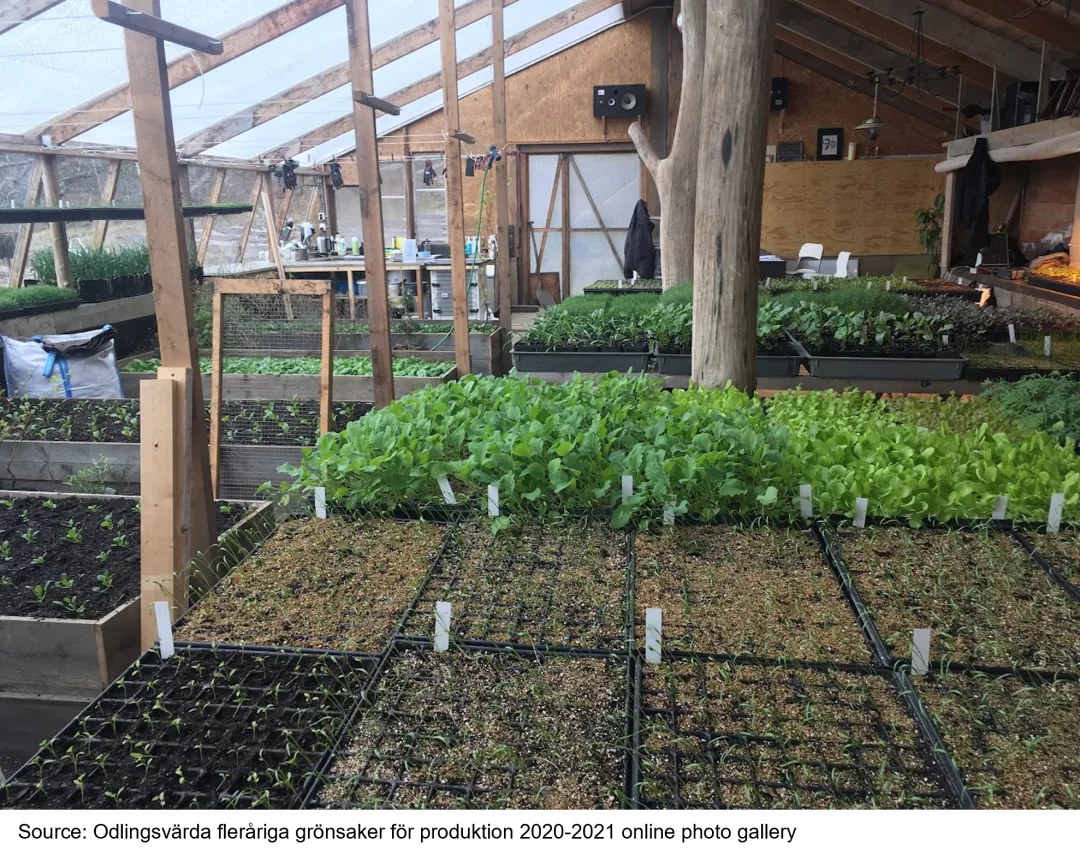General information
RDP Priority
- P4. Ecosystems management
RDP Focus Area
- 4A: Biodiversity restoration, preservation & enhancement
- 4B: Water management
- 4C: Soil erosion & soil management
RDP Measure
- M16: Cooperation
Summary
The project focused on the suitability of perennial vegetable plant species for large-scale cultivation systems and for their sale as seedlings in market gardens. The project was run by Stiftelsen Skillebyholm, an agricultural research and teaching foundation in Sörmland, Sweden. It involved four organic vegetable growers, as well as food artisans and chefs.
Perennial vegetables were tested over a two-year period and continuously evaluated with the input of other growers and consumers. The nursery production of perennial vegetable plants for recreational growers was also tested and assessed. A knowledge exchange took place, through talks, seminars, field visits for growers and workshops for food artisans. As a result, all participants of the project introduced perennial vegetables into their cultivation systems and a curated list helps growers discern the different species of perennial vegetables according to various criteria.
Results
The project has led to the following results:
- An increase in knowledge of perennial food production.
- The development of several new contacts through a cooperative network of growers regularly discussing the cultivation of perennial vegetables.
- The introduction of perennial vegetables into existing farming systems by all growers who participated in the project, with some of them now selling the vegetables directly to customers and/or restaurants.
- The creation of a curated list to help growers discern the different species of perennial vegetables according to various criteria.
Promoter
Stiftelsen Skillebyholms odlingar
Funding
Total budget: 931 790 (SEK)
EAFRD: 331 251 (SEK)
National/Regional 507 360 (SEK)
Private/Own funds 93 179 (SEK)
Ressources
Documents
Context
There are several advantages of perennial vegetables when compared to annual vegetables. They require less tillage, less irrigation (when established), are less prone to diseases and are affected by fewer pests. In addition, perennials start to grow in early spring, thereby extending the season and offering growers an income opportunity earlier in the year. Perennial vegetables are nutritious and can be of interest to food artisans, restaurants and consumers by increasing the variety and diversity of their food intake. This project was born out of an interest in the cultivation of perennial vegetables and sought to widen the focus and explore their cultivation and usage at large scale.
Objectives
The project aimed to advance the practical knowledge of perennial vegetables with a specific focus on their suitability for large-scale cultivation systems in Sweden. The project also sought to investigate whether it is feasible to scale up the sale of seedlings in market gardens and explored how best to educate chefs, food artisans and consumers in the use of perennial vegetables.
Activities
The project included the following activities:
- Perennial vegetables were tested over a period of two years on four organic farms.
- The production of the vegetables was continuously evaluated in collaboration with other growers and consumers.
- The nursery production of perennial vegetable plants for recreational growers was also tested and assessed.
- A knowledge exchange took place through talks, seminars, field visits for professional growers (20 participants) and workshops for food artisans (eight participants).
Main results
The project has led to the following results:
- An increase in knowledge of perennial food production.
- The development of several new contacts through a cooperative network of growers regularly discussing the cultivation of perennial vegetables.
- The introduction of perennial vegetables into existing farming systems by all growers who participated in the project, with some of them now selling the vegetables directly to customers and/or restaurants.
- The creation of a curated list to help growers discern the different species of perennial vegetables according to various criteria.
Key lessons and recommendations
- It was felt that two growing seasons was too short a project timeframe to thoroughly assess perennial plants.
- As the level of knowledge of perennial plants is generally very low, the food artisans and chefs would have benefitted from even more information than the project was able to provide.
- There is a need for more research collaboration at universities.
- A new project on perennial vegetables has now been started, increasing the hitherto limited geographic focus (Sörmland) to the entire Nordic region.
